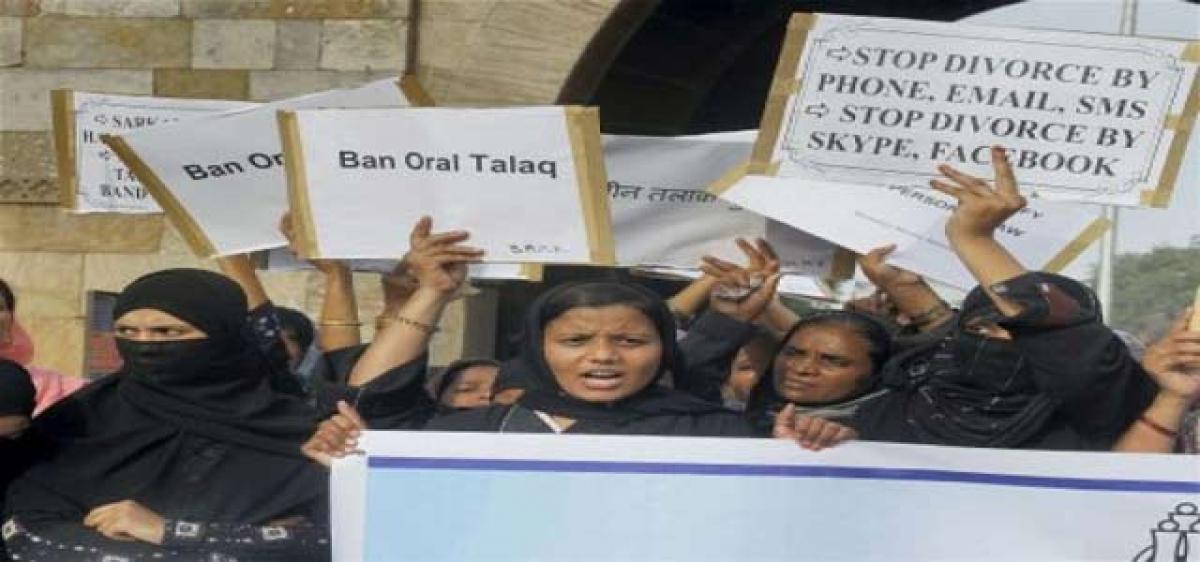Live
- SEBI notice says Hindenburg shared Adani report with client 2 months before publishing
- Furore as Shiv Sena leader son's BMW kills fisherwoman in Mumbai hit-and-run case, two detained
- Man injured after middle berth of train collapses in Bengal
- Upcoming Assembly election is a battle for survival of Maharashtra's identity and pride, says Uddhav Thackeray
- Committed to cleanliness, efficient drainage systems in Gurugram: Haryana Chief Secy
- Jemimah Rodrigues and Shikha Pandey join Trinbago Knight Riders for 2024 Women’s CPL
- With just 20 health workers per 10K people, strain on healthcare is immense
- Congress Leaders Thank Chief Ministers and Deputy Chief Ministers for Reintegrating Five Village Panchayats into Telangana
- One more big shock to BRS party
- Every adult should be Educated says Additional DC Narshing Rao
Just In

The recent judgment of the Allahabad High Court on triple talaq has come at a very opportune time when the Supreme Court is examining the issue, with women and social activists demanding it be abolished.
Time to dispense with triple talaq travesty
The recent judgment of the Allahabad High Court on triple talaq has come at a very opportune time when the Supreme Court is examining the issue, with women and social activists demanding it be abolished. In an observation, Justice Suneet Kumar had stated that the “Muslim husband enjoys an arbitrary unilateral power to inflict instant divorce” while also pointing out that personal laws cannot claim supremacy over the rights granted to the individuals by the Constitution.
Obviously, women cannot continue be at the mercy of the patriarchal set-up held under the clutches of sundry clerics, having their own interpretation of the Quran. The judgement reiterates the need for a uniform civil code as an imperative need given that gender equality and the dignity of women have become critical issues in the modern world. Even the Prime Minister has on occasions denounced the practice of triple talaq as one that goes against the rights of women, even going to the extent of ruining their lives.
Lately, the Law Commission very rightly pointed out that the introduction of a uniform civil code, that would include scrapping talaq, should come from the people. In this connection, Justice BS Chauhan, a former Supreme Court judge, stated that the Commission would shortly submit its report to the government after examining the overwhelming response received from the public.
Another significant observation too has been made by the National Commission for Women (NCW) which has told the Supreme Court that triple talaq was unconstitutional and had played havoc with the lives of innumerable women. In its affidavit filed (on November 5) to the court, the Commission stated: “These practices – triple talaq, nikah halala and polygamy – should be strictly prohibited. The NCW is supporting the stand of the Union Government and is adapting the affidavit filed by it.”
As is well known, the Centre had filed its affidavit in the apex court on October 7 and requested the abolition of triple talaq and polygamy, terming them unconstitutional customs hurting general equality and women’s dignity. The Centre pointed out that one section of women in society could never be worse off than others. Thus, it urged the Supreme Court that keeping in view that women must be treated as equal partners in development, “any practice (triple talaq, and polygamy) which denudes the status of a citizen of India merely by virtue of the religion she happens to profess is an impediment to that larger goal.”
In fact, women activists, even those belonging to Muslim communities, want this talaq travesty be done away with to ensure that women are no longer exploited. If there is need for a debate, it should be between knowledgeable persons from the Muslim community who are well-versed about their religion and the views of fundamentalists need not be considered, Modi observed recently.
The Centre, which wanted abolition of these traditions calling them “unconstitutional customs” further stated that inequality amongst women itself was not acceptable. It has cited the example of several Islamic nations such as Pakistan, Bangladesh, Afghanistan, Morocco, Tunisia, Turkey, Indonesia, Egypt and Iran, which had reformed their laws to give women equal rights in matrimony. Obviously, these nations have followed the Quran and deliberated on the issue before taking this decision.
The fact that Muslim countries, where Islam is the State religion, have undergone extensive reform, it is imperative that the practices need to be changed here as these “cannot be regarded as an integral to the practice of Islam or essential religious practices.” Moreover, there is the critical aspect of personal laws being in consonance with the Constitution of the country.
While it is indeed distressing that these laws are still prevalent in our country when many Muslim nations have reformed theirs, it is our political class which should be held responsible for being complacent and accepting or allowing these barbaric personal laws of Muslims to be still prevalent. Unequal representation in the decision-making process is no doubt a hindrance towards the ideal of gender equality.
Moreover, in a liberal country like India, these should have been reformed long back. Some social scientists believe that lack of adequate women in politics may also be reason for these laws still prevailing. At the same time, it is gratifying to see a section of women becoming increasingly assertive of their rights, implying their socio-cultural diverse norms in a particular territory.
That is why women’s groups have united to protest against injustices committed against them, including the barbarian systems prevalent in Muslim personal law. The value system has changed worldwide and India should not be lagging behind.
By Oishee Mukherjee

© 2024 Hyderabad Media House Limited/The Hans India. All rights reserved. Powered by hocalwire.com







